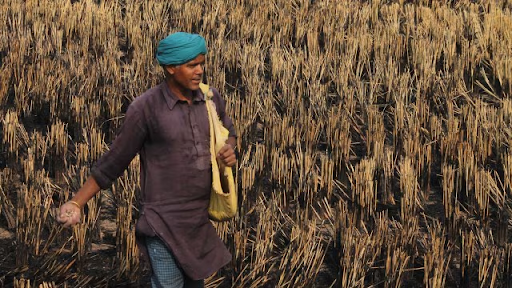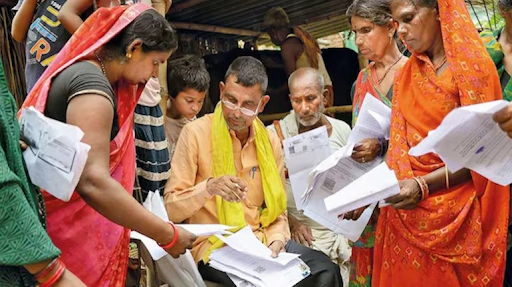



The Draft Seeds Bill, 2025 replaces the 1966 Act, makes seed registration mandatory, adds a traceability portal, and sets penalties up to ₹30 lakh while easing minor offences. Farmer groups oppose it, citing a pro-corporate tilt, weak compensation provisions, and excessive central control that affects farmer rights.

Copyright infringement not intended
Picture Courtesy: INDIANEXPRESS
The Ministry of Agriculture & Farmers Welfare prepared a draft Seeds Bill, 2025 to replace the existing Seeds Act, 1966 and the Seeds (Control) Order, 1983.
Limited Scope: The 1966 act regulates only notified seed varieties, exempting many "truthfully labelled seeds" sold by private companies from mandatory certification and quality checks.
Outdated Technology Framework: It fails to adequately address modern advancements such as genetically modified (GM) seeds and other biotechnological innovations.
Weak Penalties: Minimal penalties (e.g., a fine up to ₹500) for selling sub-standard or spurious seeds failed to deter malpractices.
No Farmer Compensation: The Act lacked a clear, statutory mechanism for farmer compensation for crop losses from failed seeds.
Mandatory Registration of All Seeds
To ensure quality control and traceability, all seed producers and dealers must register each variety before sale. A National Register of Varieties will be maintained for this.
Regulation of Seed Quality
Sets minimum standards for germination, purity, and seed health. It expands regulation to cover all types of seeds sold commercially, not just 'notified' varieties.
Protection of Farmers' Rights
Farmers retain the right to save, use, sow, re-sow, exchange, share, or sell their farm produce, including seeds of a registered variety, but cannot sell such seeds under a brand name. This is consistent with the Protection of Plant Varieties and Farmers' Rights (PPV&FR) Act, 2001.
Compensation for Farmers
Farmers can claim compensation from the seed producer if registered seed underperforms.
Regulation of GM Seeds
Genetically modified seed varieties must receive clearance under the Environment (Protection) Act, 1986 for biosafety before registration.
Enhanced Penalties
Selling poor-quality seeds could invite a penalty of Rs 30 lakh and imprisonment for up to three years.
|
Potential Benefits |
Concerns Raised |
|
Curbing Spurious Seeds: Mandatory registration and strict penalties will help tackle the menace of fake seeds. |
Over-Centralisation: Critics claim the Bill's centralized registration and regulation weaken State Governments and State Seed Certification Agencies, which are better suited for local agro-climatic needs. |
|
Improved Farmer Protection: Statutory compensation mechanism provides a legal safety net for farmers, increasing accountability in the seed industry. |
Impact on Small Seed Producers: Strict registration and licensing requirements may create a compliance burden for small seed companies, hurting market competition. |
|
Enhanced Food Security: By ensuring the supply of high-quality seeds, the Bill can boost agricultural productivity. |
Ambiguity on Farmers' Rights: Concern exists that compensation conditions or the push for branded seeds could gradually limit traditional rights. |
|
Boost to Organised Seed Sector: A transparent, regulated market fosters R&D investment by organized seed companies, resulting in better crop varieties. |
Price Regulation Concerns: The Bill lacks price control provisions, raising concern that seed companies could charge small farmers exorbitant, unaffordable prices for registered seeds. |
Sub-Mission on Seeds and Planting Material (SMSP): A centrally sponsored scheme to produce and distribute quality seeds, enhance seed testing, and promote new technologies.
Seed Village Programme: Part of SMSP, this program trains farmers to produce their own quality seeds, improving farmer-saved seed quality.
National Food Security Mission (NFSM): Provides subsidies on certified seeds of major crops like rice, wheat, pulses, and coarse cereals to encourage the adoption of high-yielding varieties.
Creation of Seed Hubs: Under the NFSM, 150 seed hubs have been established across the country to increase the availability of quality seeds at the local level. (Source: PIB)
The Draft Seeds Bill, 2025, modernizes the seed sector but must address over-centralisation, ensure fair pricing, and protect farmers' traditional rights while promoting innovation.
Source: INDIANEXPRESS
|
PRACTICE QUESTION Q. Analyze the need to balance the interests of seed corporations with the protection of traditional farming practices and biodiversity. 150 words |
Seed certification under the Seeds Act, 1966, is voluntary. However, all "notified" seeds sold must be labeled with minimum germination and purity standards. New bills propose mandatory registration for all varieties sold.
The Central Seed Committee and Central Seed Certification Board advise governments on seed matters. State Seed Certification Agencies (SSCAs) handle certification, and testing occurs in Central and State Seed Testing Laboratories.



© 2026 iasgyan. All right reserved